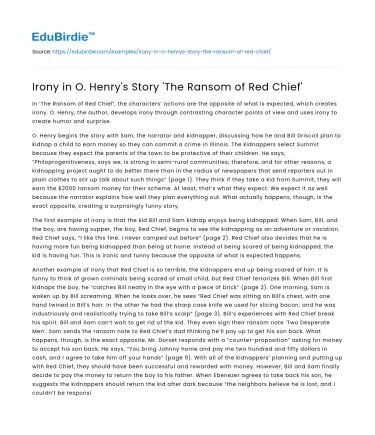In ‘The Ransom of Red Chief’, the characters’ actions are the opposite of what is expected, which creates irony. O. Henry, the author, develops irony through contrasting character points of view and uses irony to create humor and surprise.
O. Henry begins the story with Sam, the narrator and kidnapper, discussing how he and Bill Driscoll plan to kidnap a child to earn money so they can commit a crime in Illinois. The kidnappers select Summit because they expect the parents of the town to be protective of their children. He says, “Philoprogenitiveness, says we, is strong in semi-rural communities; therefore, and for other reasons, a kidnapping project ought to do better there than in the radius of newspapers that send reporters out in plain clothes to stir up talk about such things” (page 1). They think if they take a kid from Summit, they will earn the $2000 ransom money for their scheme. At least, that’s what they expect. We expect it as well because the narrator explains how well they plan everything out. What actually happens, though, is the exact opposite, creating a surprisingly funny story.
Save your time!
We can take care of your essay
- Proper editing and formatting
- Free revision, title page, and bibliography
- Flexible prices and money-back guarantee
The first example of irony is that the kid Bill and Sam kidnap enjoys being kidnapped. When Sam, Bill, and the boy, are having supper, the boy, Red Chief, begins to see the kidnapping as an adventure or vacation. Red Chief says, “I like this fine. I never camped out before” (page 2). Red Chief also decides that he is having more fun being kidnapped than being at home. Instead of being scared of being kidnapped, the kid is having fun. This is ironic and funny because the opposite of what is expected happens.
Another example of irony that Red Chief is so terrible, the kidnappers end up being scared of him. It is funny to think of grown criminals being scared of small child, but Red Chief terrorizes Bill. When Bill first kidnaps the boy, he “catches Bill neatly in the eye with a piece of brick” (page 2). One morning, Sam is woken up by Bill screaming. When he looks over, he sees “Red Chief was sitting on Bill’s chest, with one hand twined in Bill’s hair. In the other he had the sharp case knife we used for slicing bacon; and he was industriously and realistically trying to take Bill’s scalp” (page 3). Bill’s experiences with Red Chief break his spirit. Bill and Sam can’t wait to get rid of the kid. They even sign their ransom note ‘Two Desperate Men’. Sam sends the ransom note to Red Chief’s dad thinking he’ll pay up to get his son back. What happens, though, is the exact opposite. Mr. Dorset responds with a “counter-proposition” asking for money to accept his son back. He says, “You bring Johnny home and pay me two hundred and fifty dollars in cash, and I agree to take him off your hands” (page 9). With all of the kidnappers’ planning and putting up with Red Chief, they should have been successful and rewarded with money. However, Bill and Sam finally decide to pay the money to return the boy to his father. When Ebenezer agrees to take back his son, he suggests the kidnappers should return the kid after dark because “the neighbors believe he is lost, and I couldn’t be responsible for what they would do to anybody they saw bringing him back” (page 9). Instead of being worried about his son, Mr. Dorset is worried about the kidnappers’ well-being and what the town will when Red Chief returns. When the kid realizes the kidnappers are leaving him with his family, he doesn’t want to leave the kidnappers. His father, Dorset, has to hold onto the Red Chief so the kidnappers can escape. This is ironic and funny because you would expect that Dorset would hold onto the kidnappers instead of his kid so they couldn’t escape. In the end, the kidnappers ran as fast as they can out of Summit 250 dollars poorer!
The author develops contrasting points of view and the events happen differently than the reader expects. This creates irony, surprise, and humor.






 Stuck on your essay?
Stuck on your essay?

